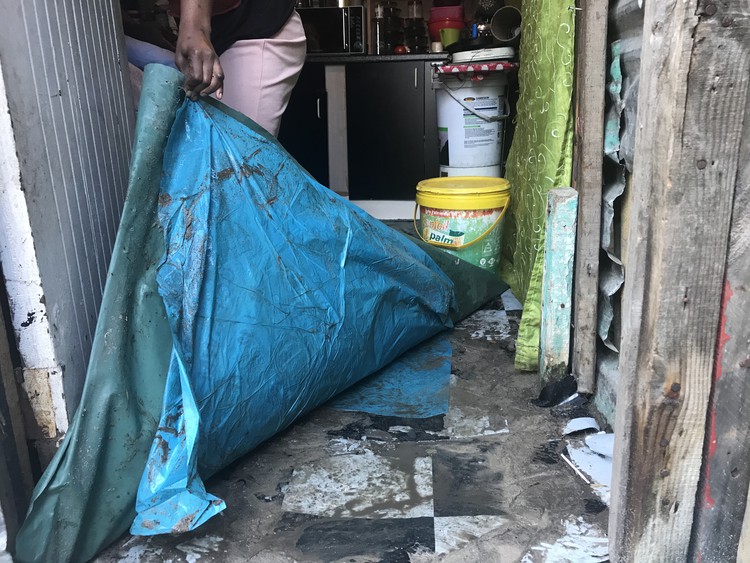Raising an autistic child in a shack
“He once disappeared and it gave us a fright. Now I have to stay and watch him all the time.”
Twelve-year-old Bonelisa Mpokotshela lives in a shack with his parents and two younger siblings. Permission to use this photo was given by his mother. Photo: Tariro Washinyira
- Monica Mpokotshela is bringing up three children in a shack.
- One of them, Bonelisa, is autistic.
- The residents of Sophia Town, Kuils River have been protesting for houses and electricity.
- Mpokotshela describes the difficulty bringing up an autistic teenager.
- She wants to find him a school soon or she will leave to the Eastern Cape.
“It is very difficult to live with an out-of-school autistic teenager in a small wet shack without electricity and water,” says Monica Mpokotshela who has been living in Sophia Town informal settlement near Kuils River for ten years.
When GroundUp visited Mpokotshela, she was trying to dry her shack, still wet from rain days before. A ridge she has constructed prevents water from flowing into the shack. She uses a large blue plastic sheet as a carpet. Her shack is dark and there is no electricity. She, her unemployed husband, and her three children will spend winter being cold.
She says that it is hard to care for 12-year-old Bonelisa in a dark settlement without lights. He sneaks out of the house.
“He once disappeared and it gave us a fright. Now I have to stay and watch him all the time. If he gets lost we won’t know where to start looking; the informal settlement is too big. This means I can’t look for work. I can’t take it anymore.”
Because the shacks are closely packed, Mpokotshela’s neighbours can hear the cries and sounds Bonelisa makes. They don’t understand his condition and complain about the noise. Also, now that he is becoming bigger, he overpowers her.
The family use this blue plastic sheet as a carpet. The shack stays wet for days after it rains. Photo: Tariro Washinyira
Mpokotshela is burnt out. She said that having Bonelisa in school would lessen her burden. He has been on a waiting list for a special needs school for a while.
She also needs a house, but she is one of many. On 29 June, hundreds of Sophia Town residents protested demanding houses, electricity and water.
Mpokotshela is considering moving to the Eastern Cape if she doesn’t get Bonelisa into a special needs school within the next few months. In the Eastern Cape she has a family to help her care for the child and the yards are spacious and secure.
What the state offers
Esther Lewis, spokesperson for the Department of Social Development, said that Mpokotshela can approach the nearest department office for assistance. She said the department funds residential homes, as well as day-care centres, for people with disabilities.
“The day-care centres provide stimulation and care for both children and adults with disabilities, while providing relief to caregivers and parents during the day. There are currently about 5,000 children with intellectual disabilities on our database. The department also funds the safe transportation of children with severe and profound disabilities to and from day-care centres,” she said.
Millicent Merton, spokesperson for Western Cape Education Department, said that special care centres are currently closed but they could support Bonelisa with an outreach team.
The provincial education department’s policy, according to Merton, is to “provide support to the learners in ordinary schools as far as possible”. Some “ordinary” schools have developed services to provide support to special needs children. “Designated special school resource centres have outreach teams that support ordinary schools,” she said.
Children with severe intellectual disability may attend Special Care Centres, Merton said. When Bonelissa was assessed in 2018 he was not found suitable for such a school.
© 2020 GroundUp.
This article is licensed under a Creative Commons Attribution-NoDerivatives 4.0 International License.
You may republish this article, so long as you credit the authors and GroundUp, and do not change the text. Please include a link back to the original article.




